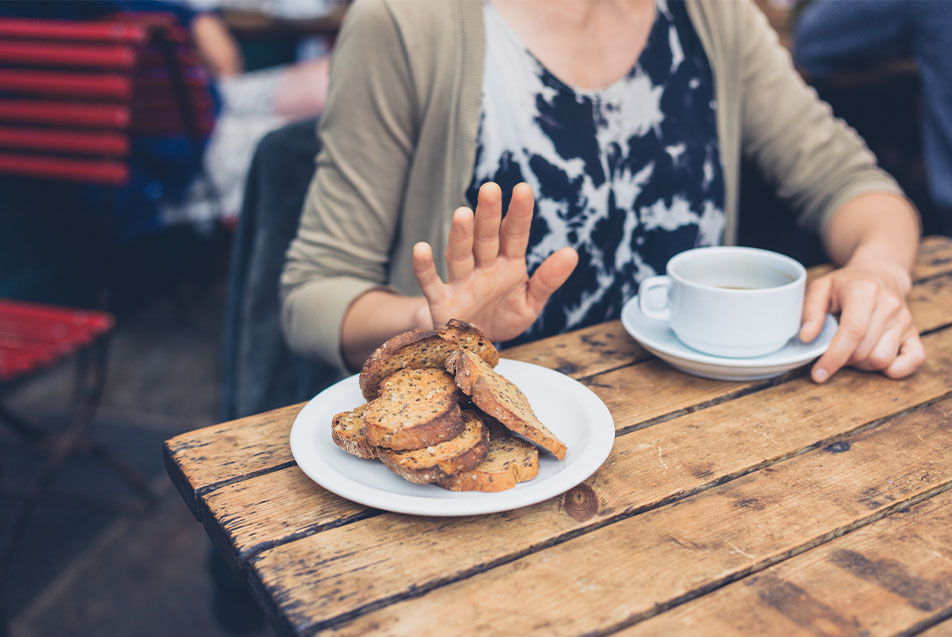
Being diagnosed with a chronic illness can be overwhelming and even devastating, but it doesn’t have to consume you. Identifying a good healthcare team and utilizing available resources can make all the difference. Gregory Scheible, MD, PPG – Gastroenterology, helps answer our questions while sharing some valuable tips on navigating a recent celiac disease diagnosis.
What can someone expect after a celiac diagnosis?
First, it’s important to remember that celiac disease is a chronic illness. It's something they're going to have to live and deal with for the rest of their life. They will have to figure out how to navigate and manage their new normal.
Also, it’s completely normal and only natural for someone to be saddened or disheartened when they realize that they’re going to have to change their lifestyle, especially the way they eat. Initially, the process is going to feel overwhelming, and they may get discouraged. But that’s when I encourage patients to get excited, because now they have a diagnosis and know why they weren’t well. Now they can begin the journey and take steps toward feeling better and healing.
What are some things to consider as someone makes the transition to a celiac-friendly lifestyle?
While there are many things to consider after a celiac diagnosis, the following are the most prevalent and a great starting point for most people:
Diet: The first thing anyone newly diagnosed with celiac disease will need to consider is their diet. They will need to adhere to a strict gluten-free diet, which will be a challenge. It’s very common for those recently diagnosed to think it’s okay if I eat a little gluten, right? But the answer is no. There have been numerous studies showing that even a little exposure to gluten prevents the body from healing.
Shopping: It's not uncommon for individuals with celiac disease to have other family members who live with the condition. But, whether it's one person or the entire family, grocery shopping will be more complex. If only one person has celiac disease, they will have to purchase foods for themselves and food for the rest of the family. Fortunately, most grocery stores these days have a wide selection and variety of gluten-free products. Many even have a designated gluten-free section for those with specific dietary requirements.
Dining out: Similar to grocery shopping, dining out might present a few challenges, but overall, many restaurants have added several gluten-free options to their menus. However, there is always a chance for cross-contamination or exposure to gluten if not careful. So, if unsure, ask questions about how food is prepared and cooked.
Cookware, cutting boards and utensils: This is an interesting topic. For the most part, newly diagnosed individuals will probably feel safer if they use different cookware, cutting boards, appliances and even utensils than those of their gluten-eating counterparts. However, recent studies have revealed minimal cross-contamination when utilizing household items such as toasters and knives. More likely, if you're using the same cutting boards or things with more porous surfaces, you may have a greater risk of exposure or contamination. Bottom line, if you take the time to wash your cookware, cutting boards, and utensils properly in between cooking for someone who doesn't have celiac disease and cooking for yourself, I think you're going to be okay. I don't see a need to buy two sets of everything. Do what feels right for you.
What are some helpful resources for those living with celiac disease?
As I mentioned, celiac disease is very common in families. So, there may be a family member, like an aunt, uncle, cousin, brother or sister, who’s been down this road and gone through a celiac diagnosis. They may have some helpful hints, advice or even insight on living with the disease. Don’t be afraid to reach out and utilize them as a resource.
A dietitian is also a great resource. Typically, when I make a celiac diagnosis, the first thing I do is refer my patient to a dietitian. They are extremely valuable in the treatment plan and care of individuals living with celiac. A dietitian can sit down and go over the ins and outs of a gluten-free diet, answer general nutrition questions (what to eat, what to avoid), meal planning, and figure out a long-term strategy that's best for them as they embark on their gluten-free lifestyle.
Lastly, the internet can be beneficial and provide individuals with all kinds of celiac information. The National Celiac Association has an abundance of information and can guide you to local chapters and support groups.
What advice would you give someone as they begin their journey?
Stay positive and understand that you are not alone. This is something that we can treat, and we're going to help you feel better. It will take time and patience with some changes to the diet and lifestyle that you are already leading.